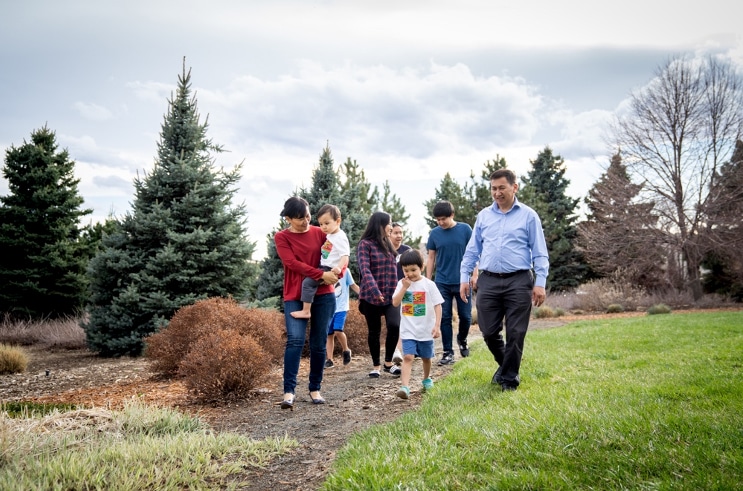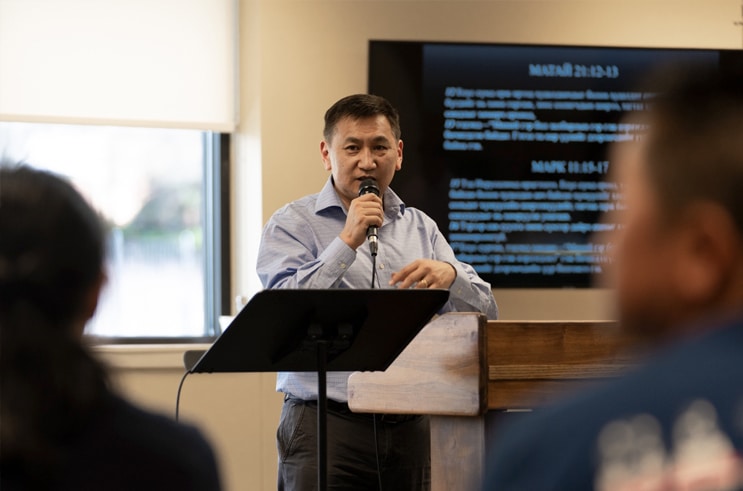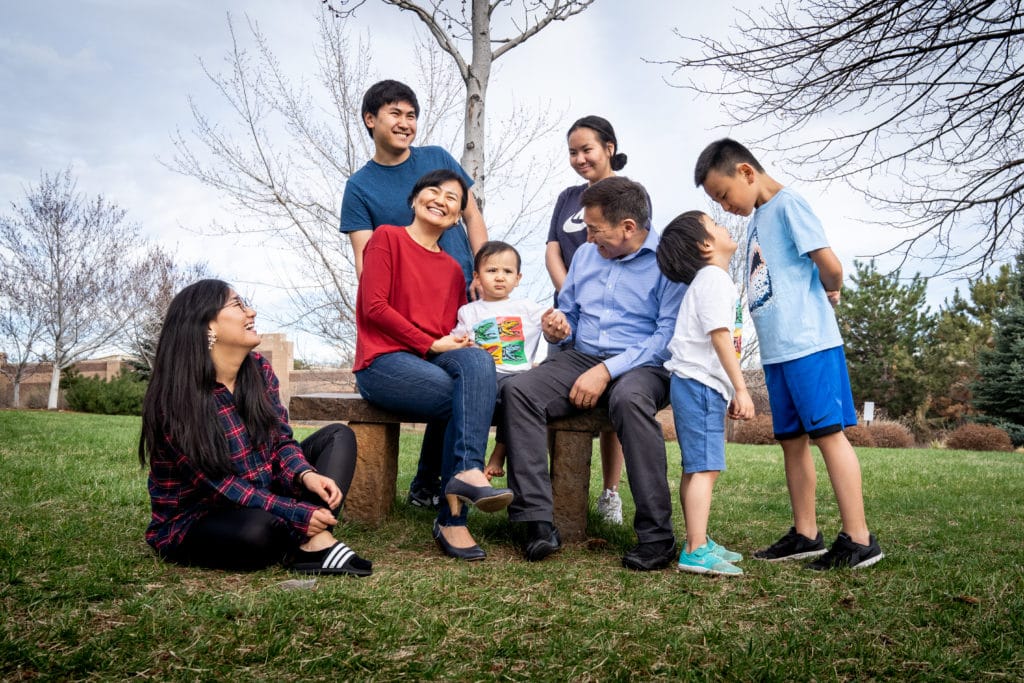Mojic Baldandorj moved his family 6,070 miles away from home.
That’s 6,070 miles away from friends, culture and the small knowings we take for granted.
We give little thought to the monotonous parts of our day. We don’t have to think about how to get to the grocery store, what kind of cereal we like best, talking to the cashier or even knowing where to park. We just do it.
So, what is compelling enough for a man to move his family across the world?

Mojic Baldandorj on a walk with his family.
INTRODUCED TO CHRIST
Mojic was asking questions to which he didn’t have answers.
After seeing men and women travel the sterile hallways of the Mongolian hospital, he knew he didn’t have the answers to life’s mysterious questions. As the souls of patients lingered between life and death, he was thinking about his own exodus from this world.
“After nursing school, I was hired as an ICU nurse at a maternity hospital in Ulaanbaatar. I encountered many life-threatening situations, and some lives were lost due to medical conditions. This got me questioning the meaning of life. I knew my life would end one day like everyone else’s,” Mojic explains.
A CRUCIAL ANSWER
Growing up an atheist in a Mongolian context, Mojic’s mind didn’t turn to the God of the Bible or religion at all. Mojic saw Christianity as the religion of Westerners. He had heard of Jesus, but the mysterious historical figure had no bearing on his life.
But whether we’re looking for God or not, He finds a way to call His people to Himself. He could do this in many ways — extraordinary miracles, dreams or angels — but He usually uses His people.
“One night in December 1991, one of my college mates visited my home with the message of theMojic remembers. “I told him that only Westerners worship Jesus, and Christianity is the religion of the Americans. Somehow, he convinced me to visit his church on the following day, and it was a day that changed my life.”
Mojic was introduced to other Christians, and they started reading the New Testament together. For Mojic, with his cultural roots in Buddhism and atheism, the idea of salvation rooted in the work of Christ — not one’s own good deeds — was a new one.
A LIFE TRANSFORMED
This new idea that changed everything. Mojic heard the good news, became a Christian and not long afterwards, he started planting churches.
“I realized the meaning of life was to serve Jesus and share His gospel with other people. I became a Christian in 1991, and a year later, I started planting churches in different parts of Mongolia. Part of God’s calling for me was to be a part of planting new churches and training Mongolian church leaders.”
But Mojic knew Mongolians weren’t just at home in Mongolia. Who would reach the others?
LEAVING HOME
In the early 2000s, many Mongolians emigrated because they felt the sting of a troubled economy.
“The country was struggling, and I think it’s still struggling. That caused many Mongolians to leave and emigrate to different countries, so there was a big immigrant movement to places like America, Canada and South Korea,” Mojic explains. “In the late 1990s and early 2000s, we saw many Mongolians going away from Mongolia. We began praying about this other mission field we needed to reach, so we prayed and asked God if we could be missionaries to Mongolian immigrants.”
For 12 years, they prayed the Lord would open a door for them to share the gospel where Mongolian immigrants were relocating. Then they heard about a dying church in Denver.
“Maranatha Mongolian Christian Church had been around for quite some time, and the congregation used to be quite large, at least by Mongolian standards. But in 2007, their pastor had to return to Mongolia. They searched for seven years for another pastor. And they went from 70 people to three,” says Mojic.

Mojic preaching on Sunday morning at Maranatha Mongolian Christian Church.
NORTH AMERICA NEEDS MISSIONARIES, TOO
We rarely think about a need for missionaries in North America. We appropriately champion stories of men and women such as Lottie Moon, Jim and Elisabeth Elliot and George Liele, who departed the shores of America and crossed oceans to take the gospel to international cultures.
Mojic and his family left their home, too, but their international mission field was the United States. They left Mongolia to bring hope to Mongolian immigrants in Denver who were asking the same hard questions Mojic was asking in college.
“There are more than 2,000 Mongolians living in Denver. My family and I live here not because of the familiar, Mongolian landscape — but because of a call for help we received in 2014,” he said. “We started small. Any time we met a Mongolian, we would invite them to our home for Bible study. And even though most Mongolians are Buddhist, almost everyone we met was open. Most Mongolians don’t even know much about Buddhism — their version of it is mostly just culture and superstition.”
In America, it’s easy for Christianity to be cultural. The comforts of the familiar can deceive us into believing the need for gospel transformation is greater overseas but minimal in our own neighborhoods.
But we don’t need to move thousands of miles away to preach the gospel and plant churches. The need is right next door. America needs missionaries, too.
“Lots of people might think it’s strange for missionaries like us to leave our country and come to America,” says Mojic. “But I think we need to shift to thinking. The mission field is here.”
Published November 6, 2020
